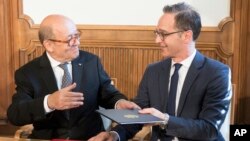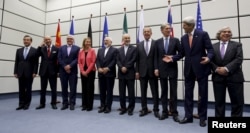When Tehran-bound AF 378 took off from Paris in April 2016, it was a heady moment for European diplomacy and commercial interests.
Iran had signed a nuclear deal with six world powers the year before, including three from Europe. Businesses, from France’s Total to Germany’s Siemens and Italian steel firm Danieli, were scrambling for a share of a promising market. The Air France flight was the airliner’s first since 2008, when service was suspended amid global sanctions over Iran’s nuclear program.
Since then, the nuclear agreement has translated into billions of dollars in revenue and thousands of jobs for Europe, a windfall that now risks drying up with U.S. President Donald Trump’s decision to withdraw from it, and threats to sanction European companies doing business with Tehran.
Yet today, the Europeans face an uncomfortable truth as they try to salvage the nuclear deal and also protect their businesses; Iran is the EU’s 33rd biggest trading power, while the United States ranks number one. That reality will weigh heavily during key talks this week, even as calls grow for Europe to stand up for its ideals and interests, and speak with a strong, collective voice.
“If we don’t unify, we’re just going to be small laughable countries that the United States, China and Russia will push over,” said Tomasz Michalski, associate Economics professor at leading French business school HEC, summing up the criticism.
Pushing back against Washington
On Tuesday, foreign ministers of France, Britain and Germany, the three European signatories to the nuclear agreement, discuss their response to the U.S. pullout and also hold talks with their Iranian counterpart, Javad Zarif. The matter is also expected to be taken up by EU leaders during a summit Thursday in Bulgaria.
Initial European reactions have been tough, with top officials vowing to stick to the Iran deal and denouncing Washington’s pullout as destabilizing and detrimental.
“Do we want to be a vassal that obeys and jumps to attention?” French Economy Minister Bruno Le Maire told Europe 1 radio, arguing the bloc must defend its “economic sovereignty” against the U.S. threats.
He laid out several proposals to protect European firms doing business with Iran, including revamping an EU-wide blocking statute, which bans companies from complying with U.S. sanctions, and making the bloc more financially independent.
Analysts have outlined other ways Europe can push back.
Scholars Steven Simon and Jonathan Stevenson argue the bloc must “acknowledge the harsh reality that it has yet to act like an organization with a GDP roughly equal to that of the United States,” they wrote in a New York Times opinion piece.
Among the options they outlined: recalling European ambassadors from Washington, and even expelling U.S. ambassadors, depending on Trump’s response and retaliating against the United States commercially. Rallying a collective response is doable, they claim, since the Iran deal is one the few areas EU members agree on.
Commentator Ellie Geranmayeh, of the European Council on Foreign relations, suggested Europe should also work with the two other Iran deal signatories, Russia and China, to get Tehran to stick the agreement.
Failing to save the nuclear deal will not only have terrible consequences for the Middle East, Geranmayeh wrote, but would drastically shrink “European relevance on global security.
But standing up to Washington may not be so simple.
“It’s going to be really difficult” for European businesses, HEC’s Michalski said. “If you do business with Iran and you want to sell to a large market like the U.S., you will basically have to choose. Either it’s Iran or the U.S.”
The Trump administration also has another powerful lever, threats of imposing steel and aluminum tariffs on the European Union, which received only a temporary exemption until June. Yet paradoxically, the added pressure “might get the Europeans to unite” and retaliate against Washington commercially, Michalski said.
Financial and political fallout
EU trade with Iran has skyrocketed from just over $9 billion in 2015 to roughly $25 billion in 2017, with Germany, France and Italy the top commercial partners.
Now, European manufacturer Airbus may offer a preview on how businesses respond to the U.S. sanctions threat. The company is expected to announce within days whether it will maintain a 2016 order to deliver 100 planes to Iran, which are crucially constructed with some U.S.-manufactured components.
Recent history is likely to weigh into its decision. France’s BNP paid a nearly $9 billion fine in 2014, for violating U.S. sanctions against Iran, Cuba and Sudan.
Part of the problem, says former French economy minister Thierry Breton, is the Iranian nuclear agreement stipulates transactions in dollars. Getting around it means changing transactions to euros, as part of a larger move to increase financial independence from the United States. This, Breton told Europe 1 radio, “risks taking time.”
Meanwhile, Air France announced this month it is scaling back flights to Iran due to poor economic performance. The airline plans to “adapt” its service in the coming months, Reuters reported, to match demand.

